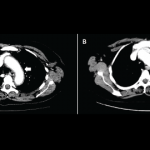 ACR CONVERGENCE 2020—In 2018, James P. Allison, PhD, and Tasuku Honjo, MD, PhD, were named the winners of the Nobel Prize in Physiology or Medicine for their discovery of cancer therapy by inhibition of negative immune regulation.1 These researchers revealed some of the ways certain proteins function as brakes on the immune system and how releasing these brakes could unleash immune cells and allow them to attack cancerous tumors. These discoveries and the practical implementation of such insights have led to an entirely new field within oncology that uses immune checkpoint inhibitors (ICIs) to effectively treat malignancy in ways that were not possible just a few years ago. However, every coin has two sides, and that is perhaps the best way to describe a potential side effect of ICIs: immune-related adverse events (irAEs).
ACR CONVERGENCE 2020—In 2018, James P. Allison, PhD, and Tasuku Honjo, MD, PhD, were named the winners of the Nobel Prize in Physiology or Medicine for their discovery of cancer therapy by inhibition of negative immune regulation.1 These researchers revealed some of the ways certain proteins function as brakes on the immune system and how releasing these brakes could unleash immune cells and allow them to attack cancerous tumors. These discoveries and the practical implementation of such insights have led to an entirely new field within oncology that uses immune checkpoint inhibitors (ICIs) to effectively treat malignancy in ways that were not possible just a few years ago. However, every coin has two sides, and that is perhaps the best way to describe a potential side effect of ICIs: immune-related adverse events (irAEs).
Core Tenets of Cancer Immunotherapy
At ACR Convergence 2020, this topic was discussed in eloquent detail during the session titled Checkpoint Inhibitors: Past, Present and Future. Jedd Wolchok, MD, PhD, Lloyd J. Old/Virginia and Daniel K. Ludwig Chair in Clinical Investigation and chief of the Immuno-Oncology Service at Memorial Sloan Kettering Cancer Institute, New York, described the core tenets of cancer immunotherapy.
Dr. Wolchok discussed the way ipilimumab augments T cell activation and proliferation by binding CTLA4, thereby blocking the inhibitory signal of this pathway. A different ICI, nivolumab, binds to the PD-1 receptor and blocks its interaction with PD-L1 and PD-L2, thereby impairing PD-1 pathway-mediated inhibition of the immune response to such entities as tumor cells. These medications are now effective components of the treatment regimens for lung cancer, esophageal cancer and melanoma, among other malignancies. Unleashing the effects of the immune system in this manner allows immune-mediated toxicities to occur in various organ systems, creating the potential for significant morbidity and mortality.
The exact incidence of irAEs is not known, and varies based on ICI regimen and the type of cancer being treated, but, as a general rule, the frequency and severity of irAEs appear to be greatest among patients receiving ipilimumab/nivolumab combination therapy, when compared with monotherapy.2-4 Colitis and hypophysitis are more common in patients receiving CTLA-4 therapy, and arthritis, pneumonitis and thyroiditis are more frequently seen in patients on PD-1 therapy.5-7
Some of the key takeaways from Dr. Wolchok’s portion of the talk were: 1) irAEs are not uncommon; 2) it is incumbent upon oncologists to screen for and promptly recognize signs of irAEs; and 3) when detected, oncologists should work together with rheumatologists to understand the nature of the irAE in question and effectively treat and manage these issues.
The Rheumatology Perspective
Laura Cappelli, MD, MHS, MS, assistant professor of medicine, Division of Rheumatology, Johns Hopkins University School of Medicine, Baltimore, spent the remainder of the lecture discussing irAEs, providing clinical pearls for clinicians. Dr. Cappelli noted the spectrum of severity for irAEs runs from mild (i.e., dermatitis, thyroid dysfunction) to severe (i.e., myocarditis, myasthenia gravis, encephalitis).
She explained that irAEs may develop at different times in relation to starting the ICI medication; indeed, these events may occur soon after starting a medication or may not appear until months or years after initiating treatment, and irAEs have even occurred after the ICI treatment had been discontinued.8 In addition, most—but not all—autoimmune rheumatic diseases have been seen as a result of an irAE, such as inflammatory arthritis, sicca syndrome, myositis and vasculitis, although interestingly, systemic lupus erythematosus appears to be quite rare as an irAE. In one prospective observational study of 60 patients with inflammatory arthritis associated with use of ICIs, persistent arthritis was found to be associated with duration of ICI use, combination ICI therapy, and in patients with multiple other irAEs.9
Several organizations, including the American Society of Clinical Oncology (ASCO), the National Comprehensive Cancer Network (NCCN), the Society for Immunotherapy of Cancer (SITC) and the European Society for Medical Oncology (ESMO), have published guidelines on treatment principles with respect to irAEs.
In general, these guidelines advocate for treatment to be guided by the severity of the irAE. The Common Terminology Criteria for Adverse Events (CTCAE) grades irAEs from 1 through 5, with Grade 1 being mild and Grade 5 representing death.10 For a Grade 2 or higher irAE, corticosteroids are typically the first line of treatment. For a Grade 3 or higher irAE, the immune checkpoint inhibitor is typically held or discontinued, in addition to providing corticosteroid treatment. In cases of severe, persistent symptoms and complications of the irAE, in spite of corticosteroids and discontinuation of therapy, treatments that have been used include a range of conventional synthetic disease-modifying anti-rheumatic drugs (DMARDs) and biologic DMARDs.
Dr. Cappelli noted that much of the data on how to treat irAEs comes from case reports and small case series and that, in the future, it will be helpful to have more data on the responses to various treatments and the natural history of irAEs to better understand treatment strategies.
An important subject Dr. Cappelli touched on is tumor response related to immunosuppression for irAEs. After all, the indication for an ICI is treatment of a malignancy, and it is important to understand if treating an irAE with immunosuppression will make treatment of the cancer less effective. So far, data are mixed on this subject and mostly limited to short-term exposure to immunosuppression. In one study of nearly 300 patients, treatment with corticosteroids and short-term tumor necrosis factor inhibitor therapy did not affect melanoma therapy with ipilimumab.11 However, in a different study involving nearly 100 patients with melanoma who had ipilimumab-induced hypophysitis, those who received higher doses of glucocorticoids had reduced survival.12 These disparate findings indicate that much more needs to be understood regarding the balance of treating irAEs with the need to effectively treat the underlying malignancy.
The subject of cancer immunotherapy is both intellectually stimulating and incredibly relevant to modern clinical practice, and this session highlighted the interesting questions that remain to be answered. One thing seems clear: Just as this session involved a set of lectures from an oncologist and a rheumatologist, so too does real-life management of irAEs require cross-specialty communication and coordination to do what is best for patients.
Jason Liebowitz, MD, completed his fellowship in rheumatology at Johns Hopkins University, Baltimore, where he also earned his medical degree. He is currently in practice with Skylands Medical Group, N.J.
References
- The Nobel Prize. News release: The Nobel Prize in physiology or medicine 2018. 2018 Oct 1.
- Larkin J, Chiarion-Sileni V, Gonzalez R, et al. Combined nivolumab and ipilimumab or monotherapy in untreated melanoma. N Engl J Med. 2015 Jul 2;373(1):23–34.
- Hellmann MD, Ciuleanu TE, Pluzanski A, et al. Nivolumab plus ipilimumab in lung cancer with a high tumor mutational burden. N Engl J Med. 2018 May 31;378(22):2093–2104.
- Hammers HJ, Plimack ER, Infante JR, et al. Safety and efficacy of nivolumab in combination with ipilimumab in metastatic renal cell carcinoma: The CheckMate 016 study. J Clin Oncol. 2017 Dec 1;35(34):3851–3858.
- Abdel-Rahman O, ElHalawani H, Fouad M. Risk of endocrine complications in cancer patients treated with immune check point inhibitors: A meta-analysis. Future Oncol. 2016 Feb;12(3):413–425.
- Naidoo J, Wang X, Woo KM, et al. Pneumonitis in patients treated with anti-programmed death-1/programmed death ligand 1 therapy. J Clin Oncol. 2017 Mar;35(7):709–717.
- Morganstein D, Lai Z, Spain L, et al. Thyroid abnormalities following the use of cytotoxic T-lymphocyte antigen-4 and programmed death receptor protein-1 inhibitors in the treatment of melanoma. Clin Endocrinol. 2017 Apr;86(4):614–620.
- Martins F, Sofiya L, Sykiotis GP, et al. Adverse effects of immune-checkpoint inhibitors: epidemiology, management and surveillance. Nat Rev Clin Oncol. 2019 Sep;16(9):563–580.
- Braaten TJ, Brahmer JR, Forde PM, et al. Immune checkpoint inhibitor-induced inflammatory arthritis persists after immunotherapy cessation. Ann Rheum Dis. 2020 Mar;79(3):332–338.
- S. National Institutes of Health. National Cancer Institute: Common terminology criteria for adverse events (CTCAE). 2020 Sep 21.
- Horvat TZ, Adel NG, Dang TO, et al. Immune-related adverse events, need for systemic immunosuppression, and effects on survival and time to treatment failure in patients with melanoma treated with ipilimumab at Memorial Sloan Kettering Cancer Center. J Clin Oncol. 2015 Oct 1;33(28):3193–3198.
- Faje AT, Lawrence D, Flaherty K, et al. High-dose glucocorticoids for the treatment of ipilimumab-induced hypophysitis is associated with reduced survival in patients with melanoma. 2018 Sep 15;124(18):3706–3714.




